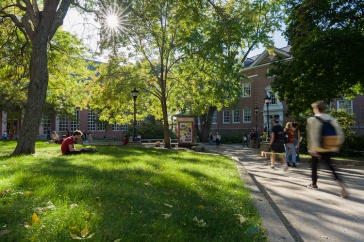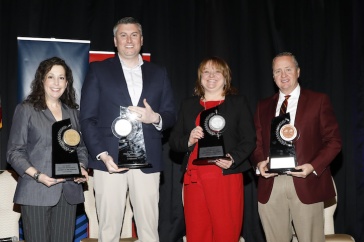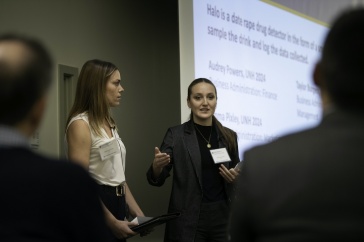It's that time of year, when the mornings are crisp and cold, the days are pleasantly sunny, and a jaunt out among rows at your local pick-your-own apple orchard is something you've got on your weekend agenda.
And while your toughest apple decision might be whether to make an apple crisp or an apple pie, many in the UNH community take this season a bit more seriously than we average apple eaters — the farmers who grow them, the researchers who study them and the chefs who turn them into something delicious.
Apples on the Menu
Three words for you: Apple cheddar pizza.
Think about. Picture it. Love it? UNHers sure do — it’s one of the most popular apple items on the menu at the three dining halls, and it’s even better because it’s made with local apples.
Of all the local food that’s brought into the dining hall, the apple might be one of the more diverse ingredients, finding its way into main courses like pork chops with brandy apple cream sauce or into a velvety apple and butternut squash soup.
“I do think students can tell if the apples and other produce they get in the dining halls are local or not; they just taste better,” says David Hill, assistant director for culinary operations.
The apples in the dining halls come from Autumn View Farm in Pittsfield, N.H., Duane Family Farm in Barnstead and Woodman Farm here on campus. Hill said he keeps them on the menus “as much as we can as long as we have them,” with some local farms being able to provide them well into the spring.
The apples available to UNH students fit in well with Dining Services’ mission to increase the percentage of local items they purchase — with ‘local’ being defined as anything withing a 250-mile radius of the Durham campus.
Hill says UNH students and other dining guests will chomp through four to six cases of apples each day — and that Dining Services can go through as many as 10 cases a day when they use them in various recipes, in addition to the regular “grab-and-go” snack students can take on the run.
Chef Chris Kaschak used to hate cooking shows like Top Chef, Iron Chef or Chopped. But now, having worked in UNH Dining Services for six years, he’s found a new appreciation for the shows — not so much for the drama of who gets cut and who wins the finale, but for how the shows have changed Kaschak’s own audience: UNH students.
“A lot more students want to try new and interesting dishes. Those types of shows have made them more savvy,” said Kaschak, who often takes student suggestions and incorporates them into the meals he’s making.
Some of those interesting dishes including the local apples were on the menu for Dining Services’ annual Harvest Dinner earlier this motnh: Apple braised red cabbage and onions, fresh local apple cider and homemade apple crisp — finished a la mode, of course, with Garelick Farms ice cream.
Apple Farming
Coming from a family that owned a fruit farm in western New York, Giff Burnap '97 always knew he would have a career in agriculture. While a student here, he took soil science classes, studied plant biology, and took some business classes while working toward his degree in horticulture and agronomy.
"I always thought I was going to be a farmer working with my parents, that was always the plan. But life changes, and we found our way back out here to New Hampshire — still growing fruit, which I really enjoy, just in a different location," said Burnap, who runs Butternut Farm in Farmington, N.H., with his wife Mae '98.

Applecrest Farm owner Peter Wagner is among many apple orchard owners throughout the state enjoying a successful fall apple season this year.
At this time of the season, says Burnap, he's doing a bit more marketing than farming, trying to get customers to swing by and enjoy the farm and the pick-your-own apples. Earlier in the fall there were peaches available for picking, and even earlier, sweet strawberries. These days it's all about apples and pumpkins for the Burnaps and their staff of four who run the farm daily.
Due to a little bit of a rough winter last year, Burnap said, the apple season might be a bit shorter this year than in 2013, when apples were available well into November. This year it's looking more like October is the month to make sure you pick your own, if you haven't already.
"It's hard to forecast a crop until early June, because you don't know anything about how buds survived the winter until the following spring."
So what about the forecasts that the upcoming winter season is going to be a brutal one? "Farmer's Almanac has been wrong before," says Burnap. "There's nothing you can do about the weather, so I try not to spend a lot of energy on it."
Chip Hardy graduated in 1974, after being enrolled at the Thompson School of Applied Science. Like Burnam, he knew he would be entering the family business — Brookdale Fruit Farm in Hollis, N.H., which has been in his family for six generations.
In addition to apples, Brookdale offers a variety of fruits and vegetables throughout the summer and fall; right now apples, fall squashes and pumpkins are the popular items.
Hardy says he's fortunate that his family "has been very upbeat in keeping up with the times and changes in agriculture" over the years.
"What we were doing in the '70s is a lot different than what we're doing today," he says. "We're doing more nutrient management, water management. Today there's a lot more science involved in growing than there was 40 years ago."
For example, he says, they're spoonfeeding their crops with nutrients rather than spreading ground fertilizers over all the soil, and they've replaced many of their standard apple trees with dwarf trees, which are easier to prune, easier to manage and easier for customers to pick from.
"We're just trying to keep up with new technology and staying right on top of things," says Hardy, who enjoys a close working relationship with the UNH Cooperative Extension team, including field specialist George Hamilton, entomologist Alan Eaton, fruit specialist Bill Lord and sustainable horticulture specialist Becky Sideman.
"I talk to a consultant from Cooperative Extension on a weekly basis. Alan Eaton was just here last week, checking out our crops," Hardy says. "And we're doing all kinds of trials on our farm with George Hamilton, monitoring sweet corn for squash vine borers."
At Applecrest Farm in Hampton Falls, Peter Wagner is happy to see the crowds of visitors come to the farm— at times by the thousands for their weekend festivals that feature pick-your-own apples, live music and other family-friendly events.
Wagner received a master's of business administration at UNH in 1968, and entered the workforce at Eastman Kodak in Rochester. But after a while, he longed to get out of the corporate world and head back to the farm he had worked on as a teenager. He returned to Hampton Falls in 1972.
"Working on a farm is such a beautiful way of life. The quality of life is unsurpassable," Wagner said recently, sitting in the late day sun amid the pumpkins and gourds that are for sale outside Applecrest's retail space.
Now enjoying the success as a Seacoast destination for families, Wagner recalls a tougher time for small-time farmers.
"There was a 20-year stretch where it was really, really tough to make it as a farmer. Applecrest's business used to heavily rely on wholesale — for nearly 90 percent of its business. To survive, the family changed its business model, and, thinking of demographics and location, decided to focus on a retail pick-your own model. Applecrest is now 80 percent retail and 20 percent wholesale.
Using his marketing smarts, and aided by his son Todd, Wagner has made Applecrest a destination for families. "you can spend the whole day here without spending a lot of money," he says.
Another boon to Applecrest and other Granite State apple orchards is the 'eat local' movement that's been gaining momentum during the past several years.
"We're hitting the market at the right time; people are excited to be eating more locally grown food, and we think we've hit that pretty well," he says.
Next up for Applecrest is a new retail space and farm-to-table restaurant, set to open later this year. The decision to venture into the restaurant biz was a family one, as are many of the decisions that happen in Wagner's apple business — while its has grown with the times in terms of the technology being used in apple farming, Wagner isn't one to jump onto the latest thing just because it's the newest idea. He won't call himself 'old school,' but he is respectful about the traditional farming that has kept Applecrest growing for more than 100 years.
"I'm not a great experimenter" when it comes to technological advances, he admits, "but if it makes sense, I'm going to do it."
Apple Nutrition
Everyone has heard the phrase, "An apple a day keeps the doctor away." But does it really? With so much in the news lately about genetically modified food, "super foods" and whether a fruit's antioxidants outweigh its sugar content, you may be wondering if the old adage is still true.
Gale Carey, Ph.D., teaches nutritional biochemistry and introduction to research at UNH, and her research focuses on how diet, exercise and exposure to environmental chemicals can increase the risk of obesity and diabetes.
And she says, yes, apples are still one of the best options if you want to get more fruit in your diet.
"Apples are a great source of both soluble and insoluble fiber, and they are low in calories — they will fill you up without a lot of calories," Carey says. They're also a good source of potassium.
She did warn that apple eaters should always wash their apples — and their hands — before enjoying that first crisp bite. Because much of Carey's research focuses on how environmental chemicals make their way into the human body, she recommends that people take every precaution possible to eliminate the chance of contaminating their fruit with any bacteria or viruses.
Carey's research has shown that "there's a lot about nutrition that we don't know," especially about trace minerals or chemicals that are in soil. So, the closer to the ground you are — being able to buy apples from farms that are local — the better, says Carey.
"With an apple, you're giving your body a wide swath of nutrients to absorb, like selenium. Although you don't hear too many people say 'I'm just not getting enough selenium,' your body does need it," she says.
-
Written By:
Michelle Morrissey ’97 | UNH Magazine | michelle.morrissey@unh.edu




















































